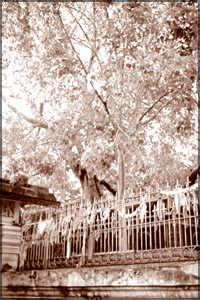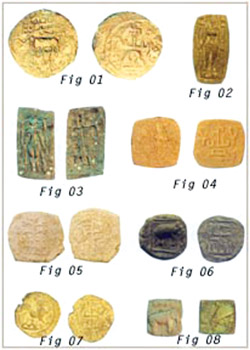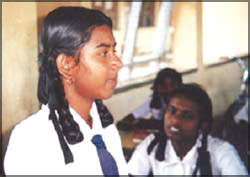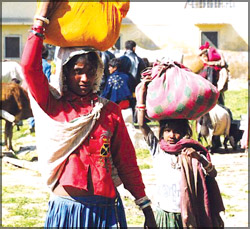|

Protecting our sacred cities
Some of you may have visited the sacred cities of Anuradhapura and
Polonnaruwa during the Poson season.
|

Jaya Siri Mahabodhi |
You may have noticed the mountains of garbage left by the
visitors; in fact, you may have contributed to this ugly scenario
yourself. Did you realise what an eyesore and a health hazard it is?
Garbage should never be disposed like that, not only in sacred
cities, but anywhere else for that matter. But, it's specially so in
places of historic and religious importance.
However, all is not lost. An environmental development plan which
includes a garbage disposal programme is soon to be implemented in the
sacred city of Anuradhapura; it will especially focus on the Mahamevuna
Uyana and Jaya Siri Mahabodhi premises.
A tree planting campaign has already got under way as part of this
plan. Another important part of this plan will be an awareness programme
on environmental protection for tourists and devotees who visit these
sacred areas.
First Milk Super Centre in Colombo
We have already made you aware about the 'Milk Super' programme
launched by the government. The first such fresh milk wholesale and
retail distribution centre was set up at Vauxhall Street, Colombo
recently.
The project has beeen initiated under the 'Colombata Kiri Gamata
Salli' theme, which will carry out wholesale and retail distribution of
milk produced by dairy farmers to consumers in Colombo and suburbs.
The programme falls under the co-operative concept. Steps will also
be taken to set up milk-super retail outlets in all schools. Once these
centres are established, they would be provided with a deep freezer, a
refrigerator, a boiler and other equipment needed for the sale of milk
to schoolchildren and parents.
Each school is expected to receive a capital investment of Rs.
200,000 from the co-operative fund, under this programme.
Conserving archaeological treasures
Sri Lanka boasts a rich culture and heritage and the thousands of
monuments of archaeological interest found
|

Some of the artifacts discovered from various parts of the country. |
in different parts of the country are ample proof of this. But
sadly, most of these monuments have been neglected over time and some
have been completely destroyed.
But for those that could still be salvaged, there's still hope left.
'Uruma Aruna', which is a project of the Archaeological Department, eyes
the conservation of 10,000 archaeological monuments. The project is to
be carried out under the instructions of the National Heritage Ministry
and will be implemented under five stages within a period of five years.
An important part of this project will be preparing the priority list
for the conservation. The project has already been implemented at the
regional level.
The research report for the conservation of the 441 artifacts in 250
locations of the Western Province and 1,851 monuments in 451 locations
of the Central Province has already been completed.
Conservation will begin in the first quarter of next year.
Providing textbooks to students
A sum of Rs. 1,890 million has been allocated by the government for
the printing and distribution of free school textbooks required for the year 2008. Arrangements are being made
by authorities to have them sent to schools within the next two months.
school textbooks required for the year 2008. Arrangements are being made
by authorities to have them sent to schools within the next two months.
The government has requested all zonal educational authorities to
forward their textbook requirements so that they could make the
necessary arrangements to provide adequate stocks of textbooks to all
schools.
Every effort is being made to provide textbooks to schools on time.
Some of the lapses that had occurred in the distribution process had
already been rectified, cutting down the delays in handing over
textbooks to students.
Upright walking may have started on trees
Tree-dwelling apes may have been the first to begin walking on two
legs, a new study by British researchers say. This questions the current
theory that more recent human ancestors were the first bipeds.
The study, published in the US journal Science says apes may have
walked on two feet with support from their arms to traverse (travel)
thin branches to collect food.
"If we're right, it means you can't rely on bipedalism to tell
whether you're looking at a human or other ape ancestor," Robin Crompton
of the University of Liverpool, one of the authors, said. "It's been
getting more and more difficult for us to say what's a human and what's
an ape, and our work makes that much more the case."
Crompton and colleagues of the University of Birmingham observed wild
orangutans in Sumatra, Indonesia for their study. Thorpe spent a year
living in the rainforest. Looking at 3,000 examples of orangutan
movement, the team found they were more likely to walk upright, with the
help of their arms, on thin branches.
They tended to walk on all fours only on the largest branches, the
researchers said. They decided to observe orangutans because they spend
their lives in trees and could serve as models for how human ancestors
moved millions of years ago.
AFP
Better life for gypsies
You would have seen and met members of the gypsy community at some
point. They are basically people that
|

Gypsy community in India
|
don't have fixed abodes and wander from place to place, doing
things such as telling fortunes and staging animal performances.
Gypsies live, not only in Sri Lanka, but in other countries as well,
especially in places such as Romania.
Gypsies including those in Sri Lanka face much hardship and
harassment as the public has no respect for them. They are marginalised
communities in society with not even the basic facilities being provided
to them. They are also a tribe that is on the path to extinction.
Now, on a concept of the Social Services and Social Welfare Ministry,
a special programme is to be initiated to upgrade the living standards
of the local gypsy community.
The programme is to be launched with a cultural festival based on the
lives of this community, to be staged at Kekirawa. The programme will be
sponsored by the International Social Services Organisation.
Essay competition
The Sri Lanka-Thailand Society in association with the Royal Thai
Embassy will hold an essay competition in the English medium to mark the
80th birthday of the King of Thailand and the 10th anniversary of the
Sri Lanka - Thailand Society.
The competition on the theme 'Cultural Heritage of Sri Lanka and
Thailand' is being conducted for schoolchildren under two age groups -
10-15 years and 15-20 years. The competition has been approved by the
Education Ministry.
The essays should be between 1,200 and 1,500 words. The completed
essays should be sent by registered post through the heads of schools
(age and name of student should be certified) to: Upali S. Jayasekera,
Hony. Secretary, Sri Lanka-Thailand Society, P 7, Government Flats,
Bambalapitiya, Colombo 4. The closing date is August 24.
The students coming first, second and third will receive cash prizes
of Rs. 25,000, Rs. 15,000 and Rs. 10,000 respectively, trophies and
certificates.
The winner will also be presented with a computer by the Royal Thai
Embassy. The schools of the two winners will also receive trophies while
12 others from each age group will receive merit certificates.
The winners will be notified by the end of August and the awards
presentation will take place on September 14 at the Thai Residence, No.
10, Sir Ernest de Silva Mawatha, Colombo 7. |
